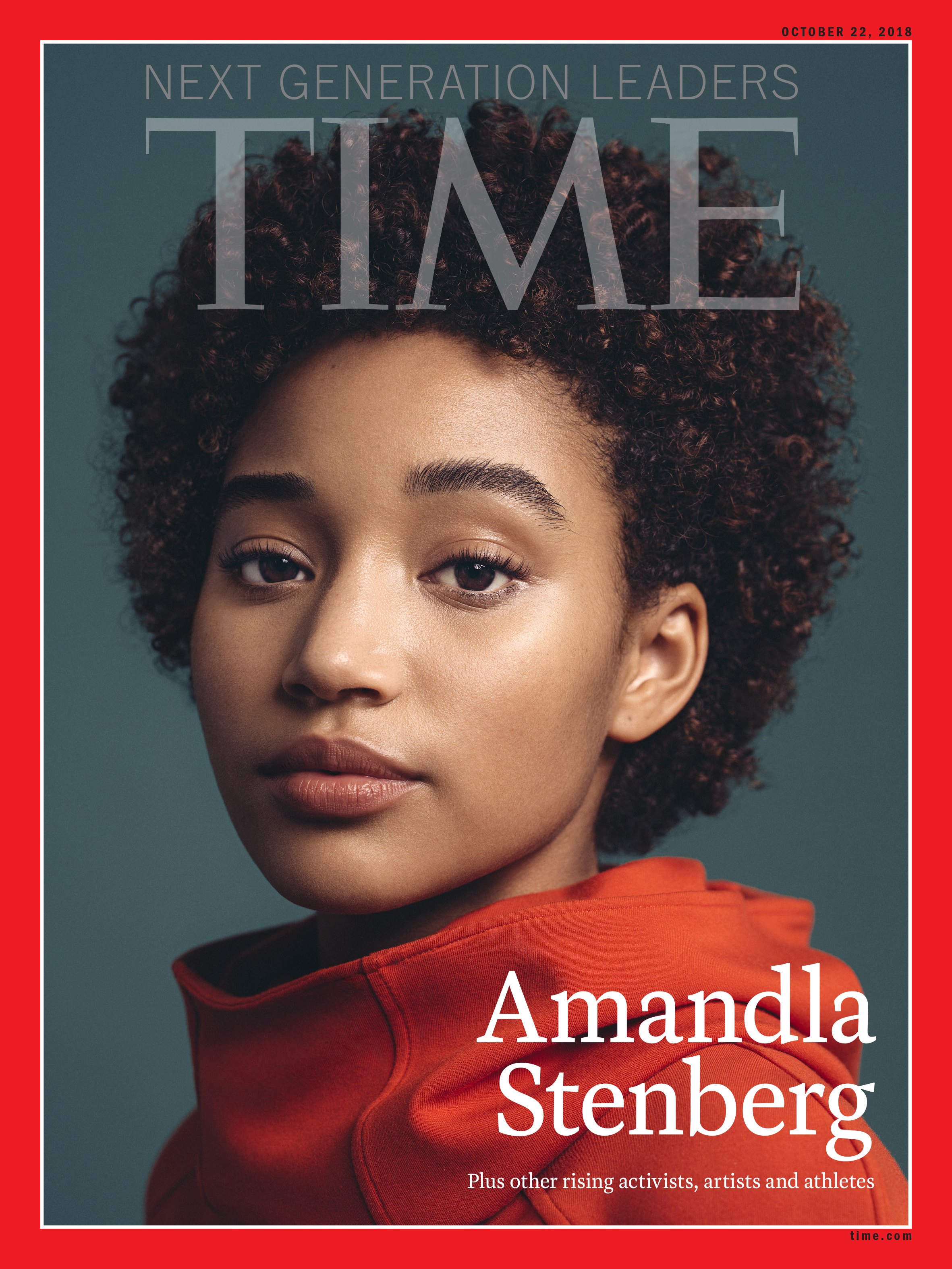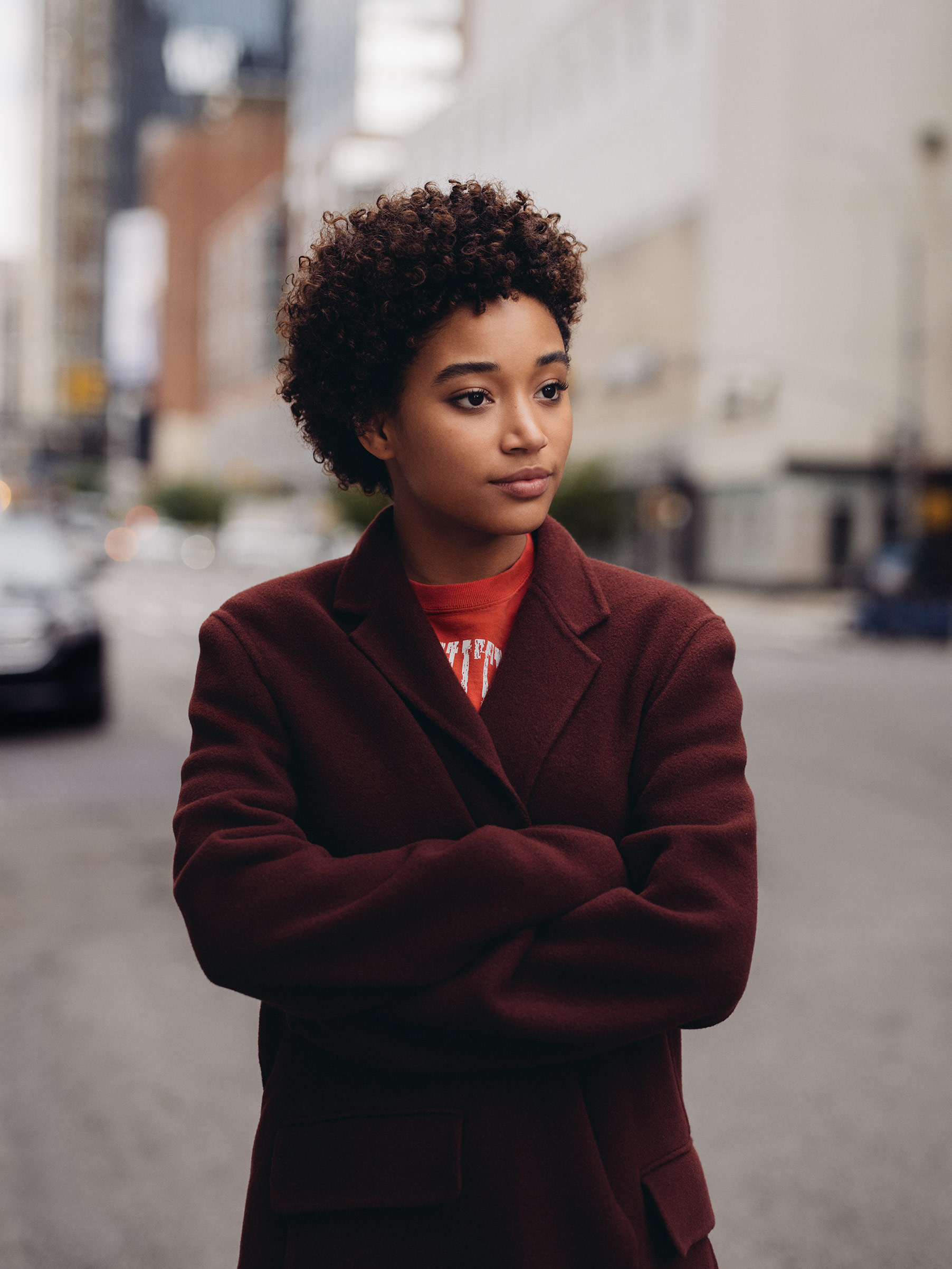Amandla Stenberg is used to having a spotlight on everything she does. “I’m always walking this precarious line of having my actions over-politicized,” she says. “But at the same time, there’s political intention in the actions.”
It’s weighty stuff for a teenager, but Stenberg, 19, stands out even in the current ecosystem of socially conscious young performers. She’s more than a movie star: she’s an activist, political pioneer and leading voice of her generation. But today, she’s just sipping a latte in the back of a Manhattan coffee shop, wearing the crispest vintage-inspired T-shirt I’ve ever seen, flimsy sweats and a pink belt bag stylishly draped on her shoulder. Her skin is super clear, which I assume is from a mixture of drinking tons of water and being totally unproblematic—the cheapest and most effective anti-aging regimen. In short, she comes across like any effortlessly cool teen you’d pass on the street.
Yet, like she said, everything Stenberg does is intentional, sometimes deceptively so. That might mean changing her Instagram handle to @amandlasponsored to satirize how brands have infiltrated social media: “I was trolling myself,” she says, “[because] there are forces at play that ensure I use it as a tool for my career.” Or it might mean choosing a film project that’s aligned with a message she’s willing to fight for. Her latest, The Hate U Give, is based on Angie Thomas’ best-selling 2017 novel by the same name, and Stenberg attached herself to the project before the book was even published.

She plays Starr, a high schooler delicately balancing her lower-class black upbringing with her upper-middle-class white private schooling. When Starr witnesses the killing of an unarmed black friend at the hands of a police officer, she’s galvanized into action—and activism. It’s a YA movie that proves the genre can tackle complex social issues with nuance, and a powerful reminder that we’re all capable of inciting change. Stenberg’s sensitive -performance is likely to make her a megastar.
She calls the making of the film a “spiritual” process, as it forced her to focus intently on the unjust treatment of people of color by police: “It was a reflection in confrontation and grieving and finding closure,” she says, although she notes “the trauma was really intense.” Yet she knew it was important enough to push through: “It didn’t necessarily scare me,” she says, “because I understood the significance of it.”
Although Stenberg got her start in films like The Hunger Games, she went viral over a school project—a video called “Don’t Cash Crop My Cornrows,” released in 2015, that explored cultural appropriation in a way that was both playful and thoughtful. She talked openly about intersectional feminism and queer identity, building a devoted following on social media—over 1.8 million followers on Instagram, where her writing is impassioned and informed. Sample caption: “Complex, nuanced stories about people of color are largely absent from history books. And when our stories ARE told, they are frequently postulated through the lens of whiteness and colonization.”
Stenberg jokes that she’s more than her talking points. “I’m, like, a three-dimensional whole-ass person!” But like most teens, she is still figuring out exactly who that person is. Part of that meant coming out to the world—and herself—as gay. “That’s what I strive for in terms of being [visible] for black girls [and] marginalized people who don’t get representation for themselves in the media,” she says. It’s different when you have millions of fans watching, but that’s not her primary concern: “If that has any sort of political weight or social weight, that’s fantastic,” she says. “There could be moments or periods of time where it has none, and that would also be fantastic.” She doesn’t need to share her whole life with the world—sometimes she just wants to like memes on her private Instagram.

She’s also been working in another medium, just for herself: music. Stenberg says she’s been experimenting with the many instruments she plays, including the drums, guitar and, her personal favorite, the violin. “It’s a strange instrument,” she says. “It requires a really specific attention to detail, but there’s no limitations on how you decide to express yourself on it.” She’s not ready to share her recordings with the world—“I would like to have one area of my privacy where there’s not a lot of pressure on it,” she says—but she’s clearly passionate. (Today she’s particularly hyped on a song she made last night, which she says sounds like a “Mario bop.”)
And while she calls social media a double-edged sword, she also recognizes how critical it’s been in helping people like her feel seen. “When social media first started popping up, it was really exciting because for the first time, we weren’t dependent on white institutions to afford us platforms of representation,” she says. “A few years later, you see the effects in Hollywood, in the diversity that’s finally being portrayed onscreen.”
Which creates room for even more voices like Stenberg’s. “I’m still figuring out what box I would like to be defined by,” she says. Then she reconsiders. “But hopefully, I’ll never be defined by any box.”
- Cybersecurity Experts Are Sounding the Alarm on DOGE
- Meet the 2025 Women of the Year
- The Harsh Truth About Disability Inclusion
- Why Do More Young Adults Have Cancer?
- Colman Domingo Leads With Radical Love
- How to Get Better at Doing Things Alone
- Michelle Zauner Stares Down the Darkness




